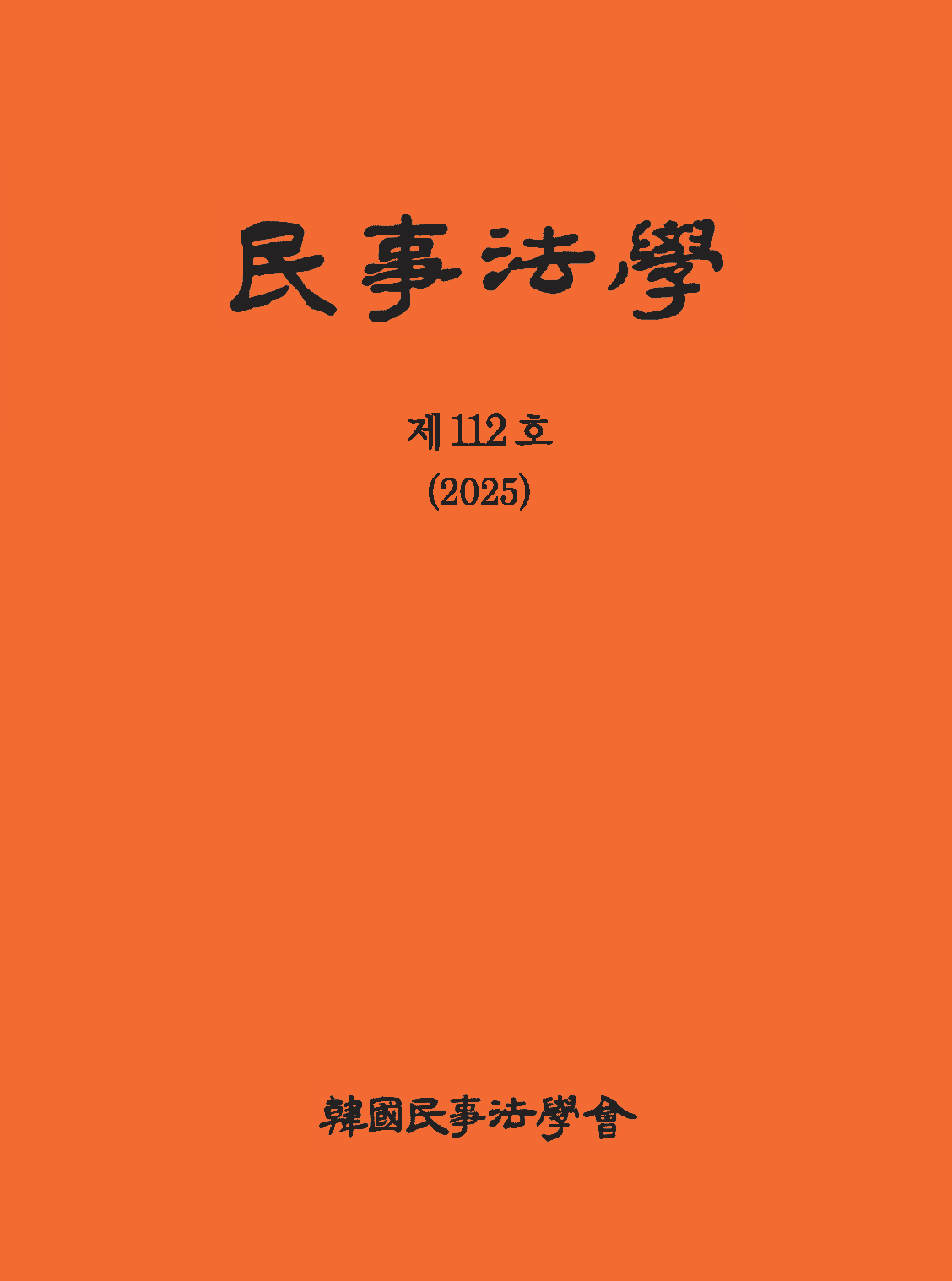학술논문
권리금에 관한 관습
이용수 14
- 영문명
- Custom concerning Kwŏlligeum (Premium paid for leasehold)
- 발행기관
- 한국민사법학회
- 저자명
- 손경찬
- 간행물 정보
- 『민사법학』제112호, 271~301쪽, 전체 31쪽
- 주제분류
- 사회과학 > 사회과학일반
- 파일형태
- 발행일자
- 2025.09.30
6,520원
구매일시로부터 72시간 이내에 다운로드 가능합니다.
이 학술논문 정보는 (주)교보문고와 각 발행기관 사이에 저작물 이용 계약이 체결된 것으로, 교보문고를 통해 제공되고 있습니다.

국문 초록
본 연구에서는 권리금의 기원과 그 변천 과정을 고찰하였다. 권리금이라는 용어는 전통사회에서 사용되던 것이 아니라, 일제강점기 일본에 의해 도입 ․ 계수된 개념이다. 권리금은 토지소유자의 직접적인 지배력이 미약한 토지에서 발생하는 경우가 많았으며, 1930년대 공로상의 가설 상가나 야시장 노점 등에서 그 관행이 형성되었다. 해방 이후에는 적산가옥(敵産家屋), 국유 철도 부지, 방공호 등에서도 권리금 수수 관행이 정착하였다. 전통사회에서 권리금과 가장 유사한 법적 구조를 갖는 제도는 농경지 소작 관계에서 발생한 화리(花利)였다. 당시 지주의 업무를 관리하던 마름이 소작인으로부터 ‘화리’를 수취하고 농경지에 대한 경작권을 이전하거나, 기존 소작인이 새로운 소작인에게 ‘화리’를 받고 경작권을 양도하는 사례가 존재하였다. 이러한 점에서 화리와 권리금은 법적 구조상 유사성이 크다고 할 수 있다. 일제강점기에는 소작권의 전매 과정에서 ‘경작권 이용 대가’로서의 화리 가격이 상승하여, 그 가액이 원 토지의 가액을 초과하는 사례도 발생하였다. 이에 따라 정부는 화리를 탈법행위로 간주하고 금지하려 하였으며, 결국 화리 관행은 폐지의 대상이 되었다.
이처럼 전통사회의 권리금은 합법적 성격과 탈법적 성격이 공존하는 일종의 관행(convention)으로 이해될 수 있다. 그러나 1960년대 이후 형성된 상가건물 임대차에 수반한 권리금 회수는 단순히 탈법적 행위로만 평가할 수는 없다. 오히려 이는 사회적 승인과 반복적 관행을 통해 정착된 것으로서, 상가건물 임대차에서의 권리금 수수는 관습(custom)으로 인정될 수 있다.
영문 초록
This study examines the origin and historical evolution of gwonrigeum(權利金, premium paid for leasehold). The term gwonrigeum was not indigenous to traditional Korean society but was instead introduced and institutionalized by Japan during the colonial period. Gwonrigeum often arose in contexts where the landowner’s direct control over the property was weak. In the 1930s, its practice developed in connection with temporary roadside arcades(gongnosang), night markets, and street stalls. After liberation, similar practices became established with respect to enemy-property houses(jeoksan gaok), state-owned railway sites, and air-raid shelters.
In traditional Korean society, the institution most closely analogous to gwonrigeum was hwari(花利), a form of payment arising within tenant farming arrangements. Estate managers(mareum), who administered land on behalf of landlords, sometimes collected hwari from tenant farmers in exchange for transferring cultivation rights; likewise, incumbent tenants often demanded hwari from new tenants when ceding those rights. In this respect, hwari and gwonrigeum shared a similar legal structure. During the Japanese colonial period, when tenancy rights were resold, hwari—originally conceived as a “fee for the use of cultivation rights”—at times escalated to levels exceeding the value of the land itself. Consequently, both in the late traditional era and throughout the colonial period, the government classified hwari as an illicit practice and sought to prohibit it. Ultimately, the hwari convention—reflecting the illicit dimension of gwonrigeum—was formally abolished.
Accordingly, gwonrigeum in traditional society can be interpreted as a convention embodying both legitimate and illegitimate characteristics. In contrast, the recovery of gwonrigeum in connection with commercial building leases, which took shape after the 1960s, cannot be dismissed as a purely illicit practice; instead, through social recognition and repeated practice, the payment of gwonrigeum in such leases became established as a custom.
목차
Ⅰ. 시작하며
Ⅱ. 한 ․ 일 양국의 권리금 제도에 관한 비교
Ⅲ. 권리금에 관한 관습-화리(花利․ 禾利)와 권리금의 상관관계
Ⅳ. 마치면서
키워드
해당간행물 수록 논문
- 채권자대위권과 대위하는 권리[피대위권리] - 형성권에 관하여 -
- 재단법인의 공익성에 관한 소고
- 계속적 계약에서 무효, 취소의 소급효 제한 - 소급효 원칙의 관철, 손해배상책임의 한계 -
- 경제적 지위의 남용에 따른 반사회질서 행위
- 신축 건물소유권 귀속에 관한 입법론적 고찰
- 기간의 정함이 있는 주택임대차와 임차인의 중도해지권 - 일본 차지차가법(借地借家法) 제38조를 중심으로 -
- 코로나19와 상가임대차 - 대법원 2025. 5. 1. 선고 2024다293580 판결을 중심으로 -
- 권리금에 관한 관습
- 하도급거래에 있어 계약자유와 계약통제
- 본안판결을 받을 이익
- 민법에서 사적 자치의 의의 ― ‘거래의 안전’ 요청과의 비교를 중심으로 한 개인적 접근 ―
참고문헌
관련논문
사회과학 > 사회과학일반분야 BEST
- AI와 디지털 문화 산업의 결합에서 저작권 및 윤리적 규범 준수의 필요성 연구
- 인공지능(AI)과 윤리
- 종합병원 간호사의 환자안전문화인식과 조직의사소통만족이 안전간호활동에 미치는 영향
사회과학 > 사회과학일반분야 NEW
더보기최근 이용한 논문
교보eBook 첫 방문을 환영 합니다!

신규가입 혜택 지급이 완료 되었습니다.
바로 사용 가능한 교보e캐시 1,000원 (유효기간 7일)
지금 바로 교보eBook의 다양한 콘텐츠를 이용해 보세요!



